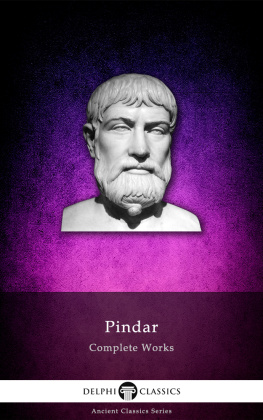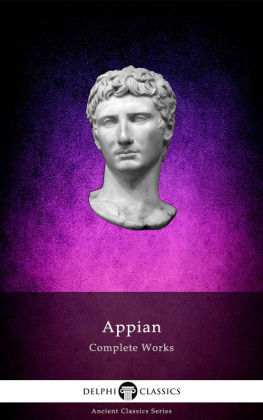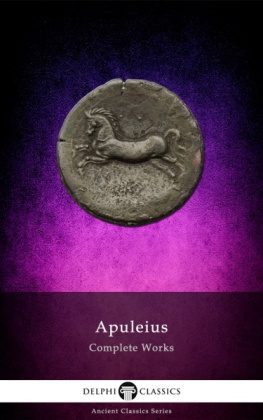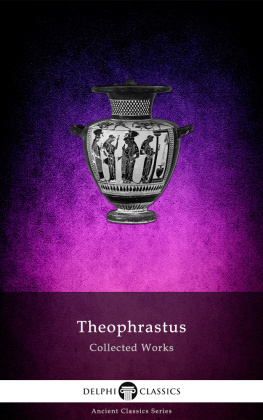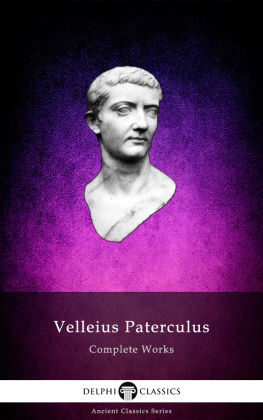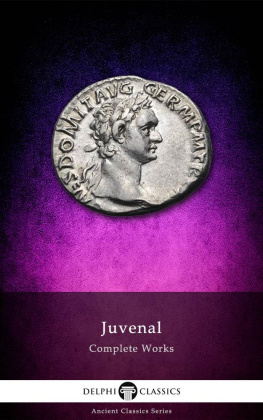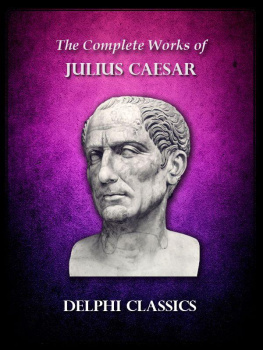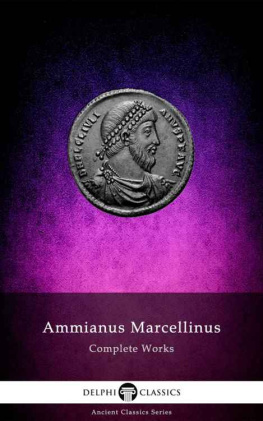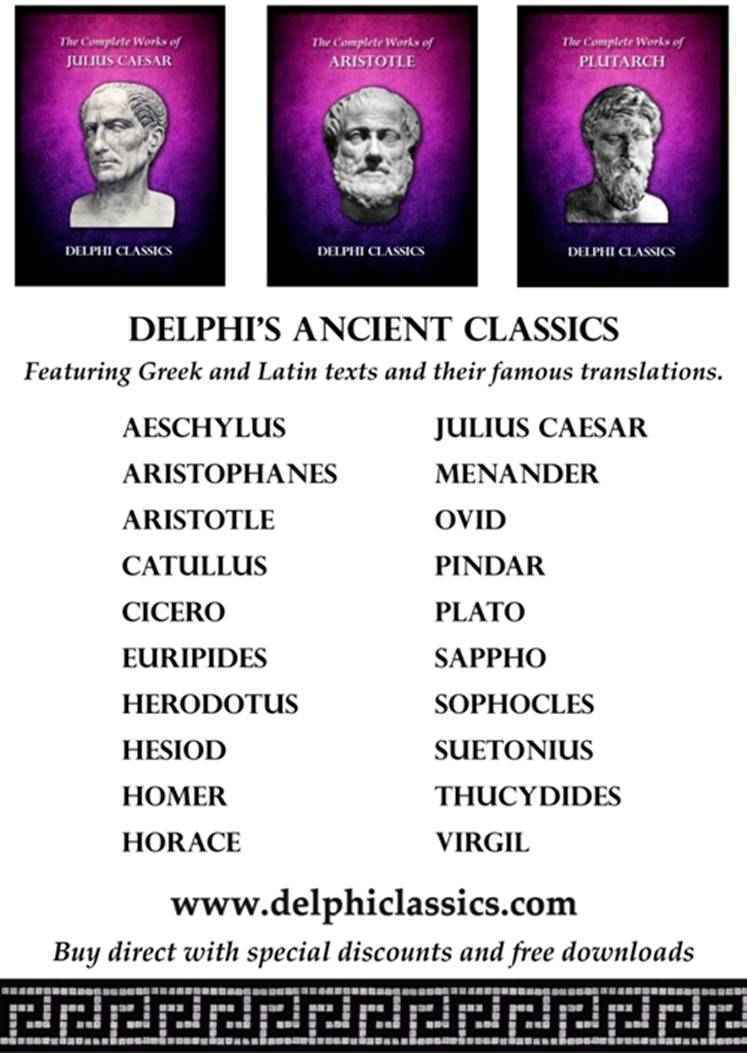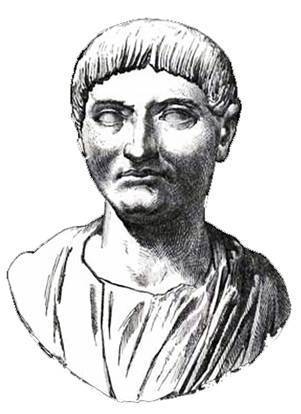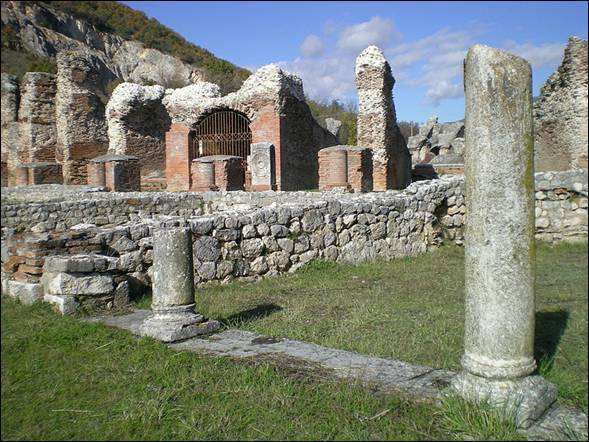The Complete Works of
SALLUST
(86 BC c. 35 BC)
Contents
Delphi Classics 2014
Version 1
The Complete Works of
SALLUST
By Delphi Classics, 2014
The Translations
The centre of LAquila, a city in the Abruzzo region of Italy, close to Sallusts birthplace, Amiternum. A statue commemorates the great historian in the city centre.
Ruins at Amiternum, Sallusts birthplace
THE WAR WITH CATILINE
Translated by J. C. Rolfe
Composed between 44 and 40 BC, Sallusts first published work details the history of the memorable year 63 BC, adopting the accepted view of Catiline as the deliberate enemy of law, order and morality, with no comprehensive explanation of his views and intentions. Lucius Sergius Catilina, (10862 BC) is best known for the second Catilinarian conspiracy, a supposed attempt to overthrow the Roman Republic and the power of the aristocratic Senate. Catiline had supported the party of Sulla, which Sallust had opposed.
Sallust had devoted his attention to a comparatively new branch of historiography, the historical monograph, making careful and conscientious preparations for his work. Suetonius tells us that Ateius Philologus supplied Sallust with an outline of the whole of Roman history, and his careful study of Thucydides and Cato are also apparent in the work. In writing about the conspiracy of Catiline, Sallusts tone, style, and descriptions of aristocratic behaviour show that he was deeply troubled by the moral decline of Rome. While he inveighs against Catilines depraved character and nefarious actions, Sallust does not fail to state that the man had many noble traits, indeed all that a Roman man needed to succeed. In particular, Sallust portrays Catiline as deeply courageous in his final battle. This subject gave Sallust the opportunity to show off his rhetoric at the expense of the old Roman aristocracy, whose degeneracy he delighted to censure strongly. As the text reveals no traces of personal experience, it is believed Sallust was on military service during the period of its composition, using Ciceros De Consulatu Suo as his main source.
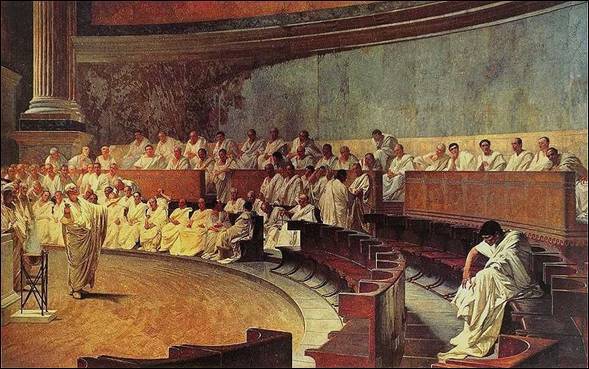
Cicero Denounces Catiline by Cesare Maccari, c. 1882
THE WAR WITH CATILINE
[1] It behooves all men who wish to excel the other animals to strive with might and main not to pass through life unheralded, like the beasts, which Nature has fashioned grovelling and slaves to the belly. All our power, on the contrary, lies in both mind and body; we employ the mind to rule, the body rather to serve; the one we have in common with the Gods, the other with the brutes. Therefore I find it becoming, in seeking renown, that we should employ the resources of the intellect rather than those of brute strength, to the end that, since the span of life which we enjoy is short, we may make the memory of our lives as long as possible. For the renown which riches or beauty confer is fleeting and frail; mental excellence is a splendid and lasting possession.
Yet for a long time mortal men have discussed the question whether success in arms depends more on strength of body or excellence of mind; for before you begin, deliberation is necessary, when you have deliberated, prompt action. Thus each of these, being incomplete in itself, requires the others aid.
[2] Accordingly in the beginning kings (for that was the first title of sovereignty among men), took different courses, some training their minds and others their bodies. Even at that time mens lives were still free from covetousness; each was quite content with his own possessions. But when Cyrus in Asia and in Greece the Athenians and Lacedaemonians began to subdue cities and nations, to make the lust for dominion a pretext for war, to consider the greatest empire the greatest glory, then at last men learned from perilous enterprises that qualities of mind availed most in war.
Now if the mental excellence with which kings and rulers are endowed were as potent in peace as in war, human affairs would run an evener and steadier course, and you would not see power passing from hand to hand and everything in turmoil and confusion; for empire is easily retained by the qualities by which it was first won. But when sloth has usurped the place of industry, and lawlessness and insolence have superseded self-restraint and justice, the fortune of princes changes with their character. Thus the sway is always passing to the best man from the hands of his inferior.
Success in agriculture, navigation, and architecture depends invariably upon mental excellence. Yet many men, being slaves to appetite and sleep, have passed through life untaught and untrained, like mere wayfarers in these men we see, contrary to Natures intent, the body a source of pleasure, the soul a burden. For my own part, I consider the lives and deaths of such men as about alike, since no record is made of either. In very truth that man alone lives and makes the most of life, as it seems to me, who devotes himself to some occupation, courting the fame of a glorious deed or a noble career. But amid the wealth of opportunities Nature points out one path to one and another to another.
[3] It is glorious to serve ones country by deeds; even to serve her by words is a thing not to be despised; one may become famous in peace as well as in war. Not only those who have acted, but those also who have recorded the acts of others oftentimes receive our approbation. And for myself, although I am well aware that by no means equal repute attends the narrator and the doer of deeds, yet I regard the writing of history as one of the most difficult of tasks: first, because the style and diction must be equal to the deeds recorded; and in the second place, because such criticism as you make of others shortcomings are thought by most men to be due to malice and envy. Furthermore, when you commemorate the distinguished merit and fame of good men, while every one is quite ready to believe you when you tell of things which he thinks he could easily do himself, everything beyond that he regards as fictitious, if not false.
When I myself was a young man, my inclinations at first led me, like many another, into public life, and there I encountered many obstacles; for instead of modesty, incorruptibility and honesty, shamelessness, bribery and rapacity held sway. And although my soul, a stranger to evil ways, recoiled from such faults, yet amid so many vices my youthful weakness was led astray and held captive my ambition; for while I of took no part in the evil practices of the others, yet the desire for preferment made me the victim of the same ill-repute and jealousy as they.



